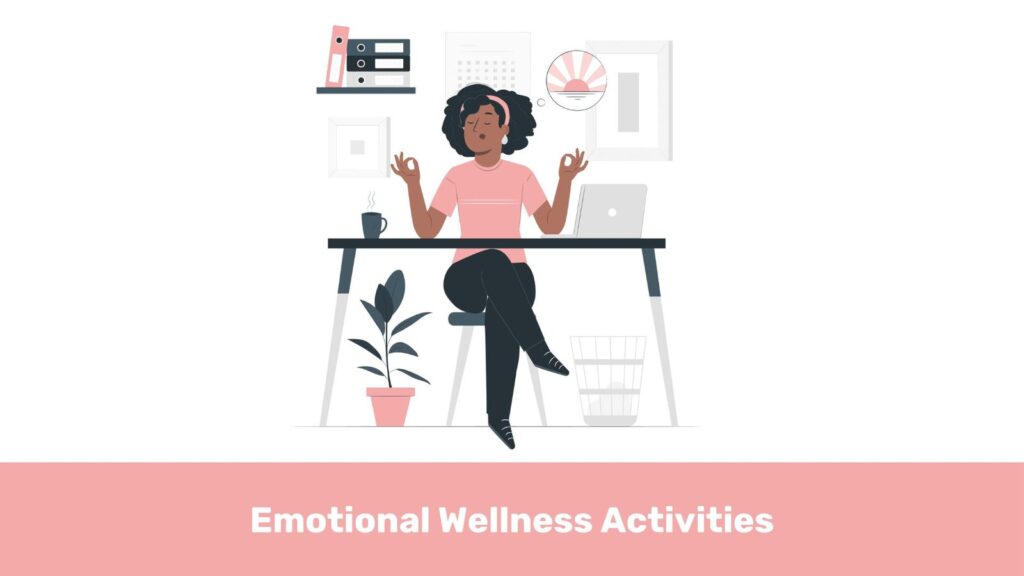Introduction
Every day, we encounter a complex array of emotions, and learning how to effectively manage them is crucial for our well-being. Emotional wellness is not just about the absence of stress; it’s about developing resilience, understanding our feelings, and responding to challenges in a healthy way. Exploring emotional wellness examples and integrating these activities into our daily routines is an essential step in this process, helping us to not only cope with stress but to thrive amidst it.
Facing daily stressors, it’s beneficial to engage in specific activities that support our emotional equilibrium. Each of these activities is more than just a way to unwind; they’re meaningful steps toward enhancing our emotional health. Whether it’s through techniques like calming breathing exercises or expressive methods like creative art, each one provides a route to greater emotional clarity and fortitude.
In this blog, we delve into 16 emotional wellness activities specifically chosen for enhancing emotional wellness. These activities provide practical strategies for managing stress effectively and nurturing a more fulfilling, emotionally balanced life. From mindfulness techniques to physical exercises that connect the body and mind, these emotional wellness examples are designed to fortify your emotional well-being and equip you with the skills for a healthier, more resilient approach to everyday stresses.
Understanding Emotional Wellness
Emotional wellness is a term that often gets tossed around in discussions about mental health, but what does it truly entail? At its core, emotional wellness refers to our ability to successfully handle life’s stresses, adapt to change, and build strong and healthy relationships. It’s about being aware of and accepting our feelings, whether they are positive or negative, and managing them in a healthy way.
The connection between emotional wellness and overall stress levels is profound. When our emotional health is in a good place, we’re better equipped to deal with the stressors that life throws our way. This doesn’t mean we won’t experience stress, but it does mean we have a stronger foundation to handle it. In contrast, when our emotional wellness is neglected, even small challenges can feel insurmountable, leading to heightened stress and its many associated health risks.
Maintaining good emotional health offers numerous benefits. According to several epidemiological studies, social and emotional support can significantly impact our physical health. These studies show that robust emotional health can protect against premature mortality, prevent illness, and even aid recovery when we do fall ill. This is because good emotional health strengthens our immune system, reduces our physical responses to stress, and improves our overall quality of life.
In essence, emotional wellness is not just a buffer against stress; it’s a vital component of a happy, fulfilling life. By nurturing our emotional health, we don’t just improve our ability to manage stress – we enhance our capacity for joy, resilience, and longevity.
Also Read: 9 Dimensions of Wellness
16 Emotional Wellness Activities for Stress Relief
Managing stress and nurturing emotional wellness are integral to a balanced life. Incorporating specific, focused emotional wellness activities into your daily routine can significantly enhance your emotional well-being. Here are 16 activities, each designed to provide relief from stress and boost your emotional health:
1. Mindful Breathing:

Practice deep breathing techniques to calm the mind. Mindful breathing helps regulate your body’s stress response and brings about a sense of peace and clarity.
2. Gratitude Journaling:

Take a few moments daily to write down things you’re thankful for. This simple practice shifts focus from negative stressors to positive aspects of life, enhancing overall happiness.
3. Progressive Muscle Relaxation:

This technique involves tensing and then relaxing each muscle group. It’s excellent for relieving physical tension and reducing stress-induced muscle discomfort.
4. Art Therapy:

Engage in creative activities like painting, drawing, or sculpting. Art therapy allows emotional expression through creativity, providing a therapeutic outlet for stress.
5. Guided Visualization:

Use mental imagery techniques to transport yourself to a peaceful setting. This form of mental escape can reduce anxiety and promote relaxation.
6. Nature Walks:

Regular walks in natural surroundings can significantly lower stress hormones. Nature’s calming effect can improve mood and cognitive function.
7. Yoga:

Yoga combines physical poses, controlled breathing, and meditation. It’s an effective way to reduce stress and anxiety, improve physical fitness, and enhance overall well-being.
8. Mindfulness Meditation:
This practice involves staying present and fully engaging with the moment. It reduces overthinking and helps manage stress by focusing on the now.

9. Journaling for Self-Reflection:

Writing about your day, thoughts, and feelings can offer valuable insights into your emotional state. It’s a powerful tool for self-discovery and stress management.
10. Listening to Soothing Music:

Calming music can have a relaxing effect on the mind and body. It’s an easy and enjoyable way to reduce stress and elevate mood.
11. Engaging in a Hobby:

Dedicating time to a hobby can be incredibly relaxing. Whether it’s gardening, cooking, or any other activity, hobbies provide a break from routine stress.
12. Socializing:

Strong social connections are vital for emotional health. Spending time with friends or family can offer emotional support and decrease feelings of loneliness and stress.
13. Laughter Yoga:

This unique form of yoga involves laughter exercises combined with yogic breathing. It’s a fun way to relieve stress and improve mood.
14. Physical Exercise:

Regular exercise is one of the most effective ways to manage stress. It not only improves physical health but also boosts endorphins, enhancing emotional well-being.
15. Healthy Eating:

A balanced diet affects overall health, including mood and energy levels. Nutritious foods can have a positive impact on stress management and emotional balance.
16. Quality Sleep:

Adequate and restful sleep is vital for mental and emotional health. Good sleep helps regulate mood, improves brain function, and is key in managing stress.
Implementing these activities into your lifestyle can help in handling life’s stresses more effectively. Each activity offers a pathway to better emotional health, providing practical ways to reduce stress and enhance your overall quality of life.
Implementing Emotional and Mental Wellness Activities into Daily Life
Incorporating emotional and mental wellness activities into your daily or weekly routine can seem daunting at first, but with some practical strategies and a commitment to consistency, it can become an enjoyable and integral part of your life. Here are some tips to help you effectively integrate these activities into your schedule:
Start Small:
Begin with small, manageable activities. Choose one or two that resonate with you and integrate them into your routine. For instance, start with five minutes of mindful breathing each morning or a brief gratitude journaling session before bed.
Set Specific Times:
Allocate specific times for these activities. Schedule them like you would any important appointment. For example, set aside time for a nature walk every Saturday morning or a yoga session on Wednesday evenings.
Use Reminders:
In our busy lives, it’s easy to forget our wellness goals. Set reminders on your phone or leave notes in visible places to help you remember your scheduled activities.
Create a Supportive Environment:
Inform your family or housemates about your new activities and their importance to you. Their support can help you stay committed. You might even encourage them to join you.
Track Your Progress:
Keep a record of your activities and how you feel after doing them. Tracking your progress can be motivating and help you identify which activities are most beneficial for you.
Be Flexible but Consistent:
While it’s important to be consistent, be flexible enough to adjust your activities to fit your changing schedule. The key is not to skip them entirely but to adapt them as needed.
Combine Emotional and Mental Wellness Activities with Existing Habits:
Link new activities to habits you already have. For example, practice deep breathing during your daily commute or listen to soothing music while cooking.
Keep It Enjoyable:
Choose activities that you genuinely enjoy. Emotional wellness should not feel like a chore. If you enjoy painting or writing, incorporate these as your go-to stress relief methods.
Reflect and Adapt:
Regularly reflect on how these activities are affecting your well-being. Don’t hesitate to modify your approach or try new activities if some don’t work for you.
Commit to the Process:
Lastly, understand that building a routine takes time. Commit to the process and be patient with yourself as you make these activities a regular part of your life.
By integrating these emotional wellness activities into your life with intention and consistency, you create a powerful toolkit for managing stress and enhancing your overall well-being. Remember, the goal is to make these activities a natural and rewarding part of your daily routine.
Personalizing Your Stress Relief Plan
Creating a stress relief plan that resonates with your personal needs and preferences is key to making emotional wellness a sustainable part of your life. Everyone’s journey to stress management is unique, and what works for one person might not work for another. Here’s how you can tailor these activities to fit your individual style and life circumstances:
Identify Your Stressors and Preferences:
Start by understanding what causes you stress and how you prefer to relax and unwind. Do you enjoy physical activities, or do you find peace in quiet, introspective tasks? This understanding will guide you in choosing the most suitable activities.
Experiment with Different Activities:
Give yourself permission to try various activities to see what suits you best. You might discover a new hobby or relaxation technique that you hadn’t considered before.
Incorporate Activities into Your Existing Routine:
Look for ways to integrate stress relief activities into your current lifestyle. For example, if you enjoy reading, consider adding books about mindfulness or emotional wellness to your reading list.
Adjust Activities to Fit Your Schedule:
Tailor the duration and frequency of activities to fit your daily routine. If you have a busy schedule, short activities like deep breathing exercises or listening to music can be highly effective.
Seek Activities That Align with Your Values:
Choose activities that align with your personal values and beliefs. This alignment can provide a deeper sense of satisfaction and fulfillment.
Use Technology to Your Advantage:
Apps and online resources can be great tools for personalizing your stress relief plan. From meditation apps to online yoga classes, technology offers a range of options to suit different preferences.
Listen to Your Body and Mind:
Pay attention to how different activities affect your mood and stress levels. Your body and mind will often signal what works best for you.
Be Open to Change:
As you grow and your life changes, your stress relief needs might also change. Be open to adapting your plan as needed.
Connect with Like-Minded People:
Sometimes, sharing the journey with others can enhance the experience. Join groups or communities that focus on emotional wellness.
Remember, It’s a Personal Journey:
Lastly, remember that personalizing your stress relief plan is a personal journey. What matters most is that the activities you choose bring you a sense of peace, joy, and relief.
By choosing and adapting activities that resonate with you personally, your stress relief plan becomes not just a set of tasks to complete, but a meaningful and enjoyable part of your everyday life.
Conclusion
The journey to emotional wellness is an integral part of managing stress in our lives. Through the 16 activities outlined, we’ve seen how varying approaches to stress relief can profoundly impact our mental and emotional well-being. These activities are more than just methods to unwind; they are essential tools that empower us to handle life’s challenges with greater resilience and composure. By incorporating these practices into our daily routines, we open the door to a life that is not only less stressful but also more enriched and fulfilling.
It’s important to recognize that taking proactive steps towards emotional wellness is an ongoing process. As you embark on this journey, remember that the goal is not to eliminate stress entirely, but to develop a deeper understanding of how to manage and alleviate it effectively. Each small step you take is a stride towards a healthier, more balanced life. Whether it’s through mindfulness, creative expression, physical activity, or social engagement, each activity offers a unique path to enhancing your emotional health.
In this endeavor, platforms like Woliba can play a pivotal role. Offering a range of emotional wellness resources, Woliba serves as an ally in your journey towards a stress-free life. With tools and support tailored to enhance employee well-being, it provides a solid foundation for individuals and teams striving to achieve emotional balance. Remember, the journey to emotional wellness is not a solitary one, and with resources like those offered by Woliba, it becomes a more accessible and supported experience.
Contact us today to create your personalized emotional wellness journey.









